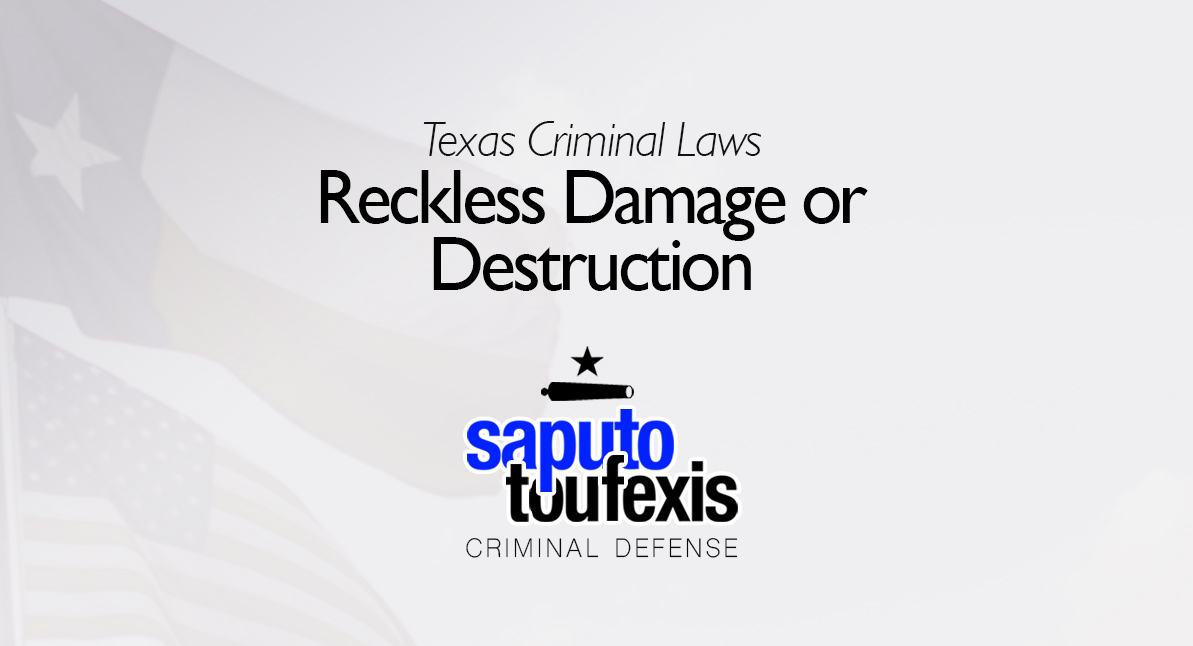The Texas Reckless Damage or Destruction law gives police the right to arrest you if they believe you “recklessly” damaged or destroyed someone’s property without that person’s consent.
FAQs about the
Reckless Damage or Destruction law in Texas
- What is the current Texas law about Reckless Damage or Destruction?
- How can I be charged with a Reckless Damage or Destruction offense in Texas?
- What is the statute of limitation for Reckless Damage or Destruction in Texas?
- What is the penalty for a Texas Reckless Damage or Destruction offense?
- Can you get probation for Reckless Damage or Destruction in Texas?
- What level of crime is Reckless Damage or Destruction in Texas?
The Texas legislature codified this criminal offense in Texas Penal Code Section 28.04. The law was not updated in 2023. In fact, this law has not been amended since 1999.
Have you been charged with Reckless Damage or Destruction? Contact us today to discuss legal representation.
or Text or Call (888) 239-9305
The key difference between Criminal Mischief and Reckless Damage or Destruction is the level of awareness (the legal term is scienter). Whereas the Texas offense of Criminal Mischief requires that you “intentionally or knowingly” damaged property, Reckless Damage or Destruction requires only that you were “reckless.”
Recklessness implies that you should have been aware of the risks of the action that caused damage, but that you did not necessarily intend them to cause damage or that you did not actually know they would cause damage. However, it is more than mere negligence. Basically, for something to have been reckless, it should have been blatantly obvious that it was going to cause damage. But you need not have absolutely known that it would cause damage or intended for it to cause damage.
Another major difference between the offenses of Criminal Mischief and Reckless Damage or Destruction is that Reckless Damage or Destruction is only a Class C misdemeanor, whereas Criminal Mischief can be punished as either a misdemeanor or a felony.
The Penal Code classifies the Texas Reckless Damage or Destruction law under Title 7 “Offenses Against Property,” Chapter 28 “Arson, Criminal Mischief, and Other Property Damage or Destruction.” Crimes under this chapter cover a wide range of offenses that focus on actions taken against property belong to other people. These offenses include both destructive actions and aesthetic changes. Learn more about the Texas offense of Reckless Damage or Destruction below.
What is the current Texas law about Reckless Damage or Destruction?
Texas law currently defines the offense of Reckless Damage or Destruction in Penal Code Section §28.04 as follows:[1]
(a) A person commits an offense if, without the effective consent of the owner, he recklessly damages or destroys property of the owner.
How can I be charged with a Reckless Damage or Destruction offense in Texas?
You can be charged with Reckless Damage or Destruction in Texas if the state’s attorneys believe that each of the elements of 28.04(a) as described in the section above have been met. You have to have actually damaged or destroyed property, you have to have done so recklessly (as opposed to negligently) and you had to have done so without the effective consent of the owner. Effective consent might be found in several different ways, but in essence it means that the owner gave you permission to cause the damage (for instance, participating in a demolition derby would probably be considered effective consent for your car to be damaged by the reckless conduct of others participating in the derby).
What is the statute of limitation for Reckless Damage or Destruction in Texas?
As a misdemeanor, Reckless Damage or Destruction charges have a two-year limitations period.[2]
What is the penalty for a Texas Reckless Damage or Destruction offense?
A conviction for Reckless Damage or Destruction in Texas is punished as a Class C Misdemeanor,[3] with a maximum possible fine under Texas state law of up to $500.
However, effective February 4, 2024, any violation of this offense can be enhanced to a third degree felony if the state can prove you committed the offense in the course of committing a Smuggling of Persons offense. [4]
Can you get probation for Reckless Damage or Destruction in Texas?
The Texas Code of Criminal Procedure allows both judges and juries to grant probation for Reckless Damage or Destruction, and judges are also allowed to accept deferred adjudication plea deals.[5]
Note, however, that judges may not grant community supervision after a conviction if (1) the defendant used or exhibited a deadly weapon during the commission of the felony or immediate flight thereafter and (2) the defendant used or exhibited the deadly weapon himself or was a party to the offense and knew that a deadly weapon would be used or exhibited.[6]
What level of crime is Reckless Damage or Destruction in Texas?
The Penal Code classifies the penalty grade of Reckless Damage or Destruction as a Class C misdemeanor. However, the offense may be enhanced to a state jail felony level offense under certain circumstances.
Learn more about the penalty range for this offense in the section above.
Legal References:
^1. Texas Penal Code §28.04. This law is current as of 2024.^2. See Code of Criminal Procedure 12.02(a)^3. Texas Penal Code §28.04(b)^4. Texas Penal Code §28.10, as enacted by SB 4, 88th Texas Legislature (SS3), Section 7^5. See Chapter 42, Texas Code of Criminal Procedure, Art. 42A.054, Art. 42A.056, Art. 42A.102^6. Art. 42A.054(b), Texas Code of Criminal Procedure










